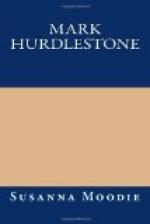Before many days had elapsed, the decided hostility of his brother’s manner could no longer escape his attention. Candid himself, and expecting Mark to be the same, he demanded the reason of his singular conduct. Mark turned upon his heel, and answered with a scornful laugh—“That if the bluntness of his speech displeased him, he knew his remedy, and might quit the Hall. For his part, he had been brought up in the country, and could not adapt his manners to suit the delicate taste of a fine gentleman.” Then, muttering something about a travelled monkey, left the room.
During the first burst of honest indignation. Algernon determined to follow him, and demand a more satisfactory explanation of his conduct, but he was deterred by the grief which he knew a quarrel between them would occasion his mother; and for her sake he put up with the insult. His wrath, like summer dew, quickly evaporated, and the only effect which his short-lived passion produced was to increase the urgency with which he entreated his father to allow him to make choice of a profession, which would remove him from the vicinity of one whose sole study was to torment and annoy him.
His father, who wished to make him feel the effects of his extravagance abroad, calmly listened to his proposals, and asked time for deliberation, and this interval had to be passed by Algernon at the Hall. For his mother’s sake, whom he fondly loved, he forbore to complain; and he hailed the approaching shooting season as a relief from the dulness and monotony of home. Used to the lively conversation of foreigners, and passionately fond of the society of the other sex, the seclusion of Oak Hall was not very congenial to his taste. He soon ceased to take an interest in the domestic arrangements of the family, and the violin and guitar, on which he performed with great taste and skill, were alike discarded, and he imprudently afforded his brother daily opportunities of poisoning his father’s mind against him, while he was lounging away his time in the houses of the neighboring gentry.
To his father, Mark affected, to commiserate the weakness of his brother’s intellect, and the frivolity of his pursuits. He commented without mercy on his idle extravagant habits—his foreign air and Frenchified manners, invidiously adding up the large sums he had already squandered, and the expense which his father must still be at to maintain him genteely, either in the army or at the bar. He always ended his remarks with an observation, which he knew to be the most galling to the pride of the old man.
“He will be just such a useless despicable fellow as his uncle Alfred, and will be the same burden to me that that accomplished unprincipled fool was to you.”




